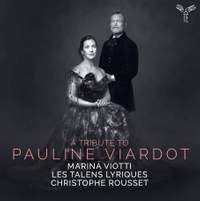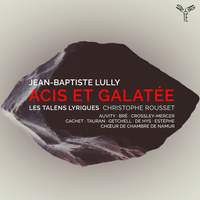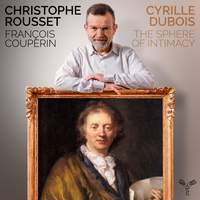Interview,
Christophe Rousset on Les Talens Lyriques at 30
 One of the many musical anniversaries which ended up being celebrated slightly belatedly due to lockdown restrictions was the thirtieth birthday of Les Talens Lyriques, the pioneering period-instrument ensemble founded by harpsichordist and conductor Christophe Rousset in 1991; they've certainly made up for lost time, however, with three very different recordings (ranging from Lully to Saint-Saëns) appearing over the last couple of months and plans to venture even further into full-blown Romantic repertoire in the works I write...
One of the many musical anniversaries which ended up being celebrated slightly belatedly due to lockdown restrictions was the thirtieth birthday of Les Talens Lyriques, the pioneering period-instrument ensemble founded by harpsichordist and conductor Christophe Rousset in 1991; they've certainly made up for lost time, however, with three very different recordings (ranging from Lully to Saint-Saëns) appearing over the last couple of months and plans to venture even further into full-blown Romantic repertoire in the works I write...
Christophe and I met up backstage at the Opéra Comique last month (just an hour before he conducted a spellbinding performance of Gluck's Armide with Véronique Gens and Ian Bostridge) to talk about why his long-term mission to turn people onto Lully isn't over yet, the cornerstone of the keyboard repertoire which he never thought he'd record until lockdown hit, and how the ensemble's quest for a regular rehearsal-venue in Paris unexpectedly blossomed into a beautiful relationship with the next generation of music-lovers and musicians...
You've had an exceptionally busy thirtieth-birthday season with Les Talens Lyriques - was a visit to the Opéra Comique always going to be an essential part of that for you?
Thirty years in and we’re still going strong! We have many projects planned in Paris and in French provinces like Toulouse and Lyon, and we’re also travelling a bit further afield – this winter we’ll be in Vienna, Brussels, London and the Netherlands as well as returning to La Scala, so it’s all quite dynamic!
There’s a nice symmetry about these performances of Armide for me, because I made my debut at the Opéra Comique thirty years ago - conducting an actual opéra-comique, Egidio Duni's La Fée Urgèle. That was written in the eighteenth century, and since then I’ve really extended my repertoire in both directions: backwards towards Monteverdi, the early Baroque and the first French operas by composers like Lully, and forwards into the nineteenth century too. One of our latest recordings is a tribute to the great Spanish mezzo and composer Pauline Viardot, which includes a lot of very Romantic music.
So much has happened in those three decades with Les Talens Lyriques that it’s quite hard to give a comprehensive overview, but expanding our repertoire has always been at the heart of what we try to do – with opera and operatic music as our main focus, as the name I chose for the ensemble implies [‘Les Talens Lyriques’ is the alternative title of Rameau’s opera Les fêtes d'Hébé]. My great passion is the voice, so I like to think of conducting as actually singing through the voice of the singers. And I have so many beautiful voices around me to do that!
Speaking of beautiful voices, when did you first work with Marina Viotti, the wonderful mezzo on that Pauline Viardot album?
I met Marina in 2020, when she was singing Zaida in a production of Rossini’s Il Turco in Italia which I was conducting in Bilbao, and I loved working with her right away – she was so flexible and full of enthusiasm, and the voice itself is so beautiful and fresh. We met up a few times to try out some French Baroque repertoire, and when I suggested this recording project to her she was so on board with the idea: instead of just being a standard collection of Handel or Rossini arias, it’s something a little bit different, telling the story of one of the great singers of the nineteenth century. I thought she’d be the perfect singer to take on the challenge, and I was overjoyed she agreed!
What's next for you in terms of recording projects? Is the focus on nineteenth-century repertoire going to continue in the immediate future?
Next week I start recording with Michael Spyres, and again that’s quite a new concept – as well as being a fantastic tenor, Michael has a fascinating way of thinking about vocality in Wagner and that’s what he wanted to explore with us on this album. He’s put together such an interesting programme tracing the composers who influenced Wagner, starting at the very end of the eighteenth century and moving through Auber, Spontini, Méhul and so many others…Wagner’s quite a departure for Les Talens Lyriques, and we’re very excited about it!
We certainly record a lot, but we always try to do things outside the mainstream – for instance, I feel like it would be completely unnecessary for me to record the Beethoven symphonies or Don Giovanni, because those pieces honestly don’t need my help! One other recent project I’m very proud of was a recording of Spontini’s La Vestale - there was a gap in the discography for a good period-instrument recording of that opera, and we were lucky enough to assemble a great cast including Marina Rebeka as Julia, Stanislas de Barbeyrac as Licinius, and Tassis Christoyannis as Cinna.
One milestone of the mainstream repertoire that you have recently committed to disc is Bach's The Art of Fugue, due for release in 2023 - what prompted you to tackle that?
I honestly thought I’d never do The Art of Fugue, but then the lockdowns hit and with all my conducting engagements cancelled I looked on that period as my opportunity to really concentrate on the harpsichord…I had so much time to crack open the score, study it and consider it afresh, and after all that I finally felt ready to get into the studio and record it. I used one of my own harpsichords, an anonymous instrument which has such a beautiful sound and so many different colours. It was the most wonderful project: I also recorded the Bach toccatas, and the pieces for two keyboards with one of my students.
Lully has been a near-constant presence in Les Talens Lyriques' repertoire, with a new recording of Acis et Galatée just released, and more to come in 2023...What's special about that particular opera for you, and do you feel that attitudes towards Lully's music in general have shifted since you started championing him three decades ago?
Acis et Galatée is a very late opera (1686), and towards the end of his career you see Lully using the orchestra more and more…In his earlier works it’s a little more like the Italian Baroque operas of the time - so with a lot of continuo, and the orchestra mainly reserved for the dances and choruses. A bit later on he introduced accompanied arias and accompanied recitatives, and you see the orchestra taking up more and more space as time goes by… So in these last operas Armide and Acis et Galatée you have him making the widest and most dramatic use of the orchestra yet, and it’s very touching because it opens the way to the future.
It’s a very beautiful piece, I think. The plot is not especially developed, but there are so many moments where he depicts strong emotions in such a startling way: fear, anger, lamentation, jealousy, all so vividly portrayed. I think Lully is a really fascinating composer, so I’m going on with my complete journey through his works: next year will be Thésée and Atys, and we’ve just recorded Psyché. That’s been one of the big projects of the last thirty years for us - and our work isn’t finished yet, because often people still think Lully’s boring and Rameau’s music is much superior…But it isn’t - it’s just one century later, and it was Lully who opened a lot of the doors in the first place!
'Opening doors' in another sense has been a key part of the ensemble's activities in recent years, with residencies in secondary schools and participatory concerts playing a vital role in getting younger audiences excited about this music - how did that side of things begin?
It actually came about when we were trying to find a place to rehearse, because that’s no easy business in Paris…We don’t have our own base or concert-hall so we’re kind of itinerant, and I thought maybe rehearsing in schools could be useful for everybody: the kids would have access to beauty and music, and we’d have a rehearsal-space! It developed in so many directions, and now our activities are completely integrated into their curriculum: they play a little, they sing a little, and they’ve even danced a little as well…We’ve created apps to help them understand more about the orchestra and the harpsichord, and they’ve even done some interviews with the musicians which have been broadcast by France Musique, so it’s very much focused on them being actively involved in music rather than just listening passively.
I don’t know if you will see some of these young people in the audience tonight, but I have had some classes come to the shows and they were so excited about knowing the conductor – some of our players went into the school to explain a little beforehand, and it’s lovely to see that transmission of enthusiasm happening. Who knows how many of them will go on to become regular concert-goers later on in their lives, but at least opening the way to beauty is always worth doing. It’s also about showing that it’s not just for the elite – that beauty is accessible, and it’s right there for you if you just push the door!
Marina Viotti (mezzo), Les Talens Lyriques, Christophe Rousset
Available Formats: MP3, FLAC, Hi-Res FLAC
Cyril Auvity (Acis/Apollon), Ambroisine Bré (Galatée/Diane), Edwin Crossley-Mercer (Polyphème)
Les Talens Lyriques, Christophe Rousset
Available Formats: MP3, FLAC, Hi-Res FLAC
Cyrille Dubois (tenor), Christophe Rousset, Les Talens Lyriques
Available Formats: CD, MP3, FLAC, Hi-Res FLAC





